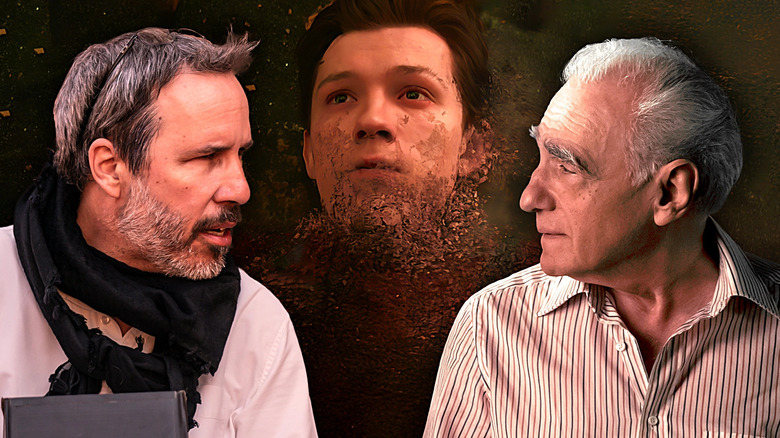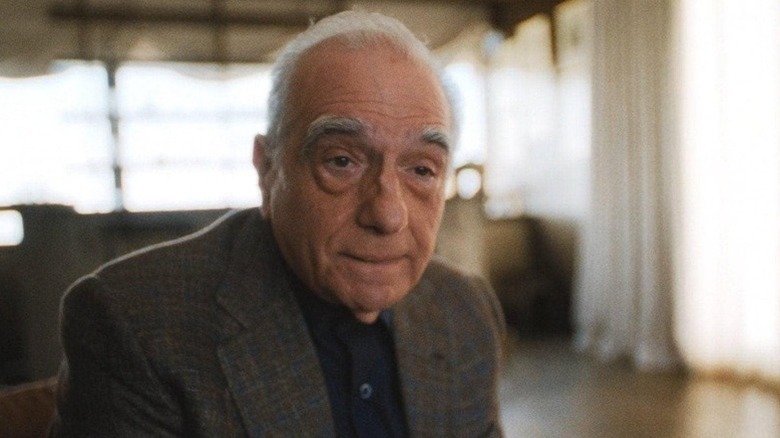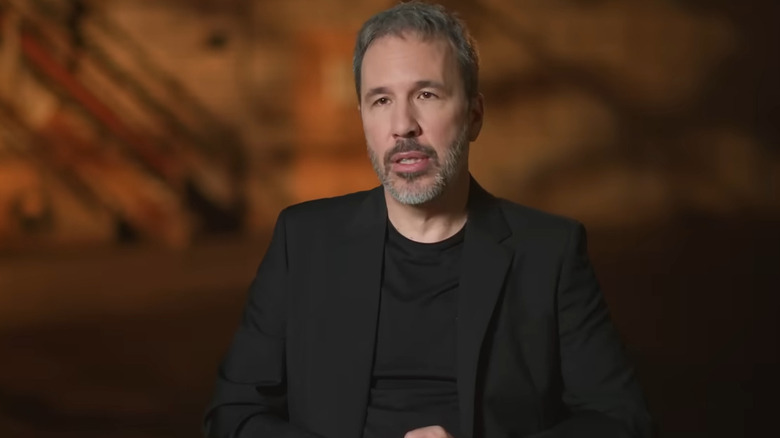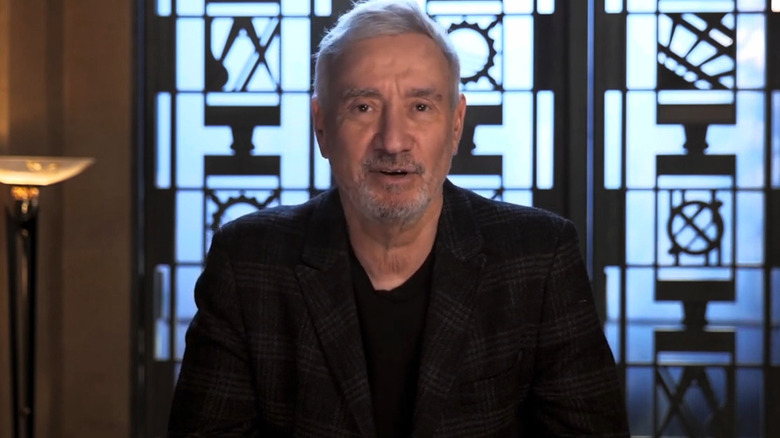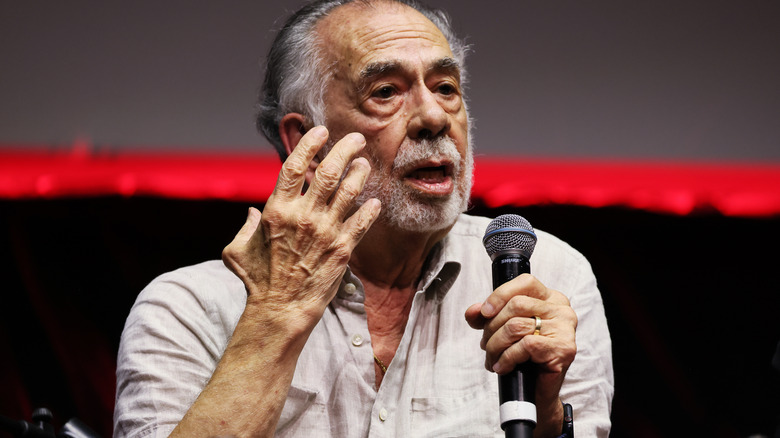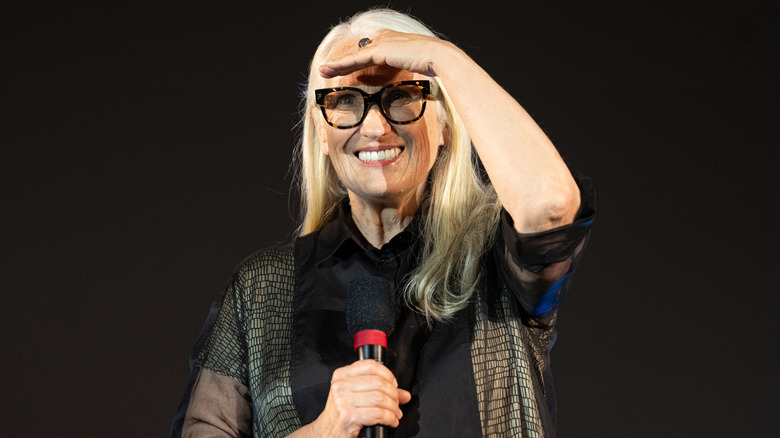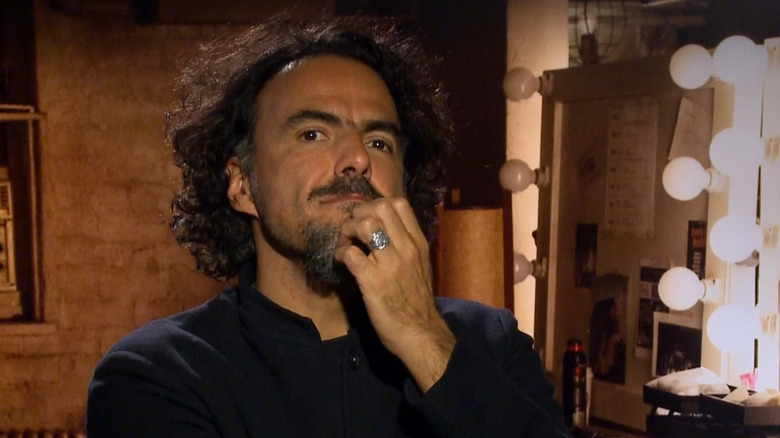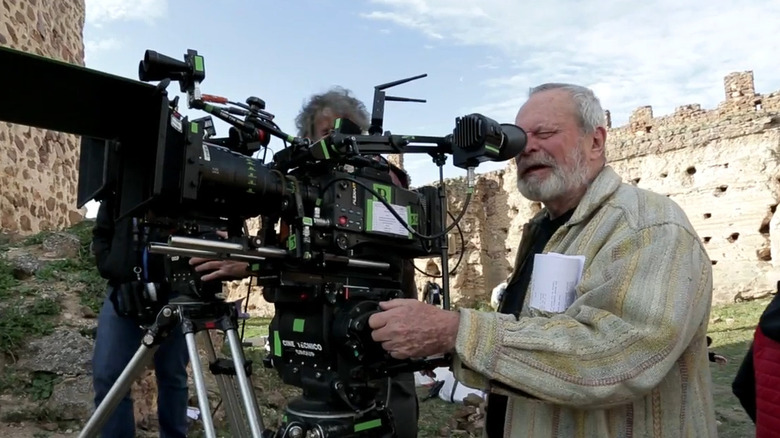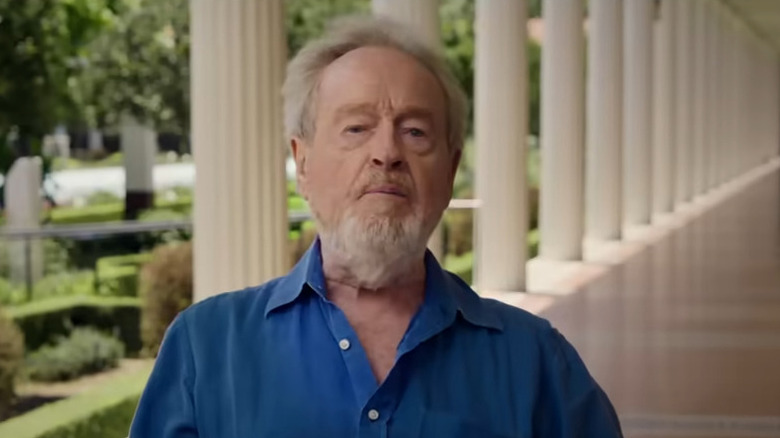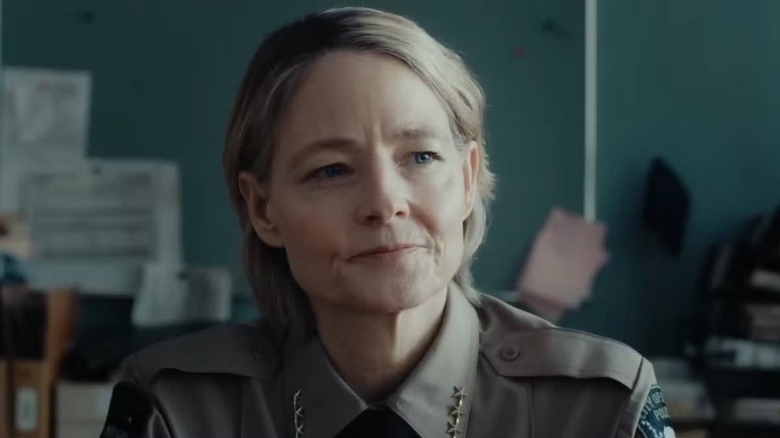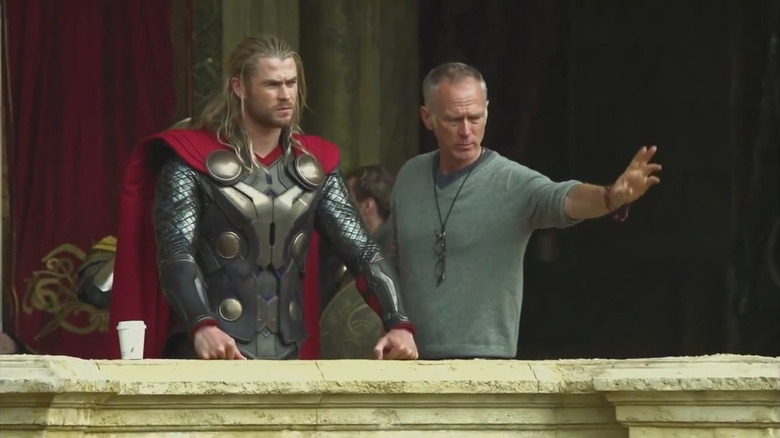10 Directors Who Hate Marvel Movies
The Marvel Cinematic Universe may not quite be the cultural force it was throughout the 2010s, with something like "Captain America: Brave New World" being seen as a box office gamble rather than a surefire hit. Gone are the days where fans could be certain the newest MCU flick would be met with positive praise on Rotten Tomatoes and netting a sizable profit. Even so, the franchise isn't without its merits, and it shows no signs of slowing down anytime soon.
The MCU was king of the hill for many years, and you don't reach that level of popularity without making a few enemies. Plenty of fans watch whatever comes out in theaters or on Disney+ for some escapism, but plenty of filmmakers adamantly believe the MCU has ruined the nature of cinema or at the very least aren't challenging audiences to engage with art in any meaningful way. The MCU may have gotten the likes of Ryan Coogler and Sam Raimi to make movies for them, but you shouldn't expect any of these directors to make a Marvel movie no matter how good the paycheck might be.
Martin Scorsese
MCU enemy #1 is none other than Martin Scorsese, the poster child for calling out the MCU even though his comments could best be defined as "mild" at best. Scorsese infamously said that superhero movies weren't "cinema" and that they were more akin to "theme parks" than actual art. His comments came out in 2019 when MCU fever was at an all-time high, riding off the success of "Avengers: Endgame" and "Spider-Man: Far From Home." Suffice it to say, the internet didn't take too kindly to Scorsese's comments at the time.
Scorsese is a filmmaking legend, so if he has an opinion on a certain genre, it's probably worth it to hear him out. Perhaps that's why so many affiliated with Marvel reacted publicly to his comments, including Marvel Studios head Kevin Feige, who insisted MCU movies do, in fact, take risks seeing as "Avengers: Infinity War" ended with half of the universe dusted. However, Feige also insisted that everyone is entitled to their opinion, and with a franchise that has regularly busted out billion-dollar hits, it's likely safe to assume Feige isn't crying himself to sleep at night.
In the years since Scorsese's comments, the MCU has become far more hit-and-miss with its quality with the likes of "Ant-Man and the Wasp: Quantumania" and "Thor: Love and Thunder." If the director had said the same thing today, would anyone even bat an eye?
Denis Villeneuve
Denis Villeneuve is no stranger to franchise and blockbuster filmmaking, having helmed one of the best legacy sequels ever with "Blade Runner 2049" and making two great films out of the seemingly unadaptable "Dune." While Villeneuve understands the power and responsibility of working with tremendous budgets, he's not above throwing shade at the big player on the block. In 2021, Villeneuve had some choice words for the MCU: "There are too many Marvel movies that are nothing more than a cut and paste of others."
The director's comments may ring true for some, as so many MCU movies tend to have a scientific genius as a protagonist, a villain with similar powers to the hero, and quippy dialogue. But Villeneuve actually has a connection to one Marvel movie in helping make it a little better — Chloe Zhao's "Eternals." Both "Eternals" and "Dune" came out around the same time, and Zhao spoke about working with Villeneuve to get inspiration on how to properly use IMAX. He even provided additional references to her, and she referred to him as a "friend."
To be fair, "Eternals" is arguably the one Marvel movie you can't really say is cut and paste from anything else the MCU did before. The director's comments are likely more of a generalization about how safe the MCU plays it.
Roland Emmerich
Roland Emmerich is the king of the disaster movie with "Independence Day" and "The Day After Tomorrow" bringing carnage and worldwide destruction to the masses. Superhero movies tend to end with collapsed buildings as well, but Emmerich has spoken on several occasions about how he isn't a fan. During a 2019 junket (via Business Insider), Emmerich admitted, "When I see Marvel movies, my eyes glaze over. I watch them on the plane so I can fall asleep."
That comment came when Emmerich was promoting his film "Midway." A few years later when getting the word out for "Moonfall," Emmerich once again set his sights on Marvel when speaking with Den of Geek and the state of blockbuster entertainment as a whole. "Naturally Marvel and DC Comics, and Star Wars, have pretty much taken over," he stated. "It's ruining our industry a little bit, because nobody does anything original anymore."
The idea that Hollywood doesn't take creative risks anymore is nothing new. Many probably echo Emmerich's sentiments that the entertainment industry is too reliant on pre-existing intellectual property. Emmerich largely does original films although even he's not immune to having to dip into sequel territory when he helmed 2016's "Independent Day: Resurgence." If audiences thought something like "Man of Steel" had too much destruction, it'd be fascinating to see what Emmerich could do combining his disaster film sensibilities within the constructs of the superhero genre.
Francis Ford Coppola
There's something disheartening about seeing a true master of filmmaking taking time away from talking about whatever project they have coming up or reflecting on cinema as an art form to talk about Marvel movies. Is it really that much of a surprise to hear that Francis Ford Coppola isn't a fan of "Ant-Man?" Alas, that's just the kind of world we've occupied for the past decade, and shortly after Martin Scorsese's Marvel comments went viral, Coppola came forward to support him.
One could argue Coppola went even further in his MCU criticisms in 2019, calling them "despicable" while adding: "When Martin Scorsese says that the Marvel pictures are not cinema, he's right because we expect to learn something from cinema, we expect to gain something, some enlightenment, some knowledge, some inspiration. I don't know that anyone gets anything out of seeing the same movie over and over again." However, Coppola may have a soft spot for certain superhero projects, as director Ryan Coogler revealed in the "Black Panther" commentary track (via The Hollywood Reporter) that he showed an early cut of the film to Coppola, and as soon as it finished, Coppola wanted to go back and rewatch the scene of T'Challa (Chadwick Boseman) yelling at Zuri (Forest Whitaker) about his father's failures in raising Killmonger (Michael B. Jordan).
Then again, Coppola may just have a case of not liking anything that comes out of the mainstream anymore. When speaking with Variety while promoting "Megalopolis," Coppola took aim at Hollywood as a whole and his idea of the central problem in the industry right now: "The job is not so much to make good movies, the job is to make sure they pay their debt obligations."
Jane Campion
Jane Campion is one of the most influential female filmmakers working today and one of the few woman to win Best Director at the Oscars. But don't expect a Marvel movie to be next on her filmography.
To be fair, she didn't necessarily call out Marvel specifically but rather all superhero movies. At 2021's AFI Fest (via Variety), she definitively stated, "I actually hate them," in reference to superhero films. She continued, "They're so noisy and like ridiculous. Sometimes you get a good giggle, but I don't know what the thing is with the capes, a grown man in tights. I feel like it must come from pantomime."
Campion, whose films include "The Piano," "In the Cut," and "The Power of the Dog," was probably never a big contender for directing a blockbuster film anyway. But she's not completely out of the loop when it comes to what's popular in the zeitgeist. She offered major praise to "Barbie" when speaking to Deadline while slyly throwing shade at Marvel: "For once we have a film that's not about Marvel characters but a humorous and very creative take on the Barbie and Mattel story."
Alejandro G. Iñárritu
Alejandro G. Iñárritu won the Oscar for Best Director for his send-up of the superhero film genre, 2014's "Birdman or (The Unexpected Virtue of Ignorance)." In a bit of meta casting, Michael Keaton plays an actor who's famous for playing a superhero a long time ago and longs to return to that world, insisting it's part of his identity. When it comes to filming a true-blue superhero flick, Iñárritu doesn't seem interested.
The director spoke with Deadline in 2014 when "Birdman" came out, and he claimed, "I think there's nothing wrong with being fixated on superheroes when you are 7 years old, but I think there's a disease in not growing up." He continues that while they can provide some mindless entertainment, "They are honestly very right wing. I always see them as killing people because they do not believe in what you believe, or they are not being who you want them to be. I hate that."
Curiously, a similar sentiment was shared by Alan Moore, writer of "Watchmen" and "From Hell," expressed concern to Variety that the obsession with superhero media was a sign of the populace becoming infantilized. "That kind of infantilization — that urge towards simpler times, simpler realities — that can very often be a precursor to fascism." Iñárritu was far less dismissive of the superhero genre years after "Birdman," but it's still probably too much to hope for the director making a "Ghost Rider" movie.
Terry Gilliam
With movies like "Brazil" and "12 Monkeys" in his filmography, it might sound a bit weird to hear director Terry Gilliam wish for more realism. But there's some truth to be found in his comments toward Marvel movies, as he criticized them at the 2018 Karlovy Vary International Film Festival (via RogerEbert.com): "It's the tension between reality and fantasy that is interesting, and that's why I don't like all the big Marvel movies ... There is no real physical reality to the films. There is no gravity, and gravity is everything. Things fall, and no matter how high you want to jump, you are always brought back down."
It sounds like Gilliam is pointing to the lack of stakes or emotional tension that can occasionally be present in superhero movies. Characters punch each other, but there's no real weight to those attacks with heroes and villains flying around like rag dolls. Where's the tension of Thanos (Josh Brolin) wiping out half of the universe in "Infinity War" if we all know they have to come back somehow in "Endgame" because "Spider-Man: Far From Home" comes out just a few months later?
Gilliam isn't a total curmudgeon when it comes to Marvel movies though, as strangely, he admitted to liking one Marvel movie, in particular. "'Ant-Man' I quite liked, I think there's a lot of really good stuff in there," he claimed. "And technically, it's brilliant. But it's also predictable, ultimately." Predictable but entertaining is a pretty fair assessment of many Marvel movies, and it's proof there's a way for MCU films to speak to the old guard of directors.
Ridley Scott
Ridley Scott has undoubtedly had a major influence on the superhero genre. He's directed some of the most prolific science-fiction and action films of all time, like "Alien," "Blade Runner," and "Gladiator," that have gone on to inspire the next generation of filmmakers. Scott clearly doesn't mind getting into sequel territory given "Gladiator II," but him directing a superhero film for Marvel seems like a step too far.
Scott has perhaps the most uncouth public opinion of superheroes, as he told Deadline, "Their scripts are not any f***ing good ... They're mostly saved by special effects, and that's becoming boring for everyone who works with special effects, if you've got the money." Scott admits that he feels like Ripley (Sigourney Weaver) from "Alien" and Maximum (Russell Crowe) from "Gladiator" are basically superheroes in their own rights, which in his mind makes it more inexcusable that traditional superhero movies can't get the stories right.
Even more shocking is the fact Scott has reportedly been offered superhero movie directing gigs before but turned them down. We're immensely curious what Marvel or DC movies Scott could've helmed, but we'll have to make do with "Gladiator 3" instead.
Jodie Foster
Jodie Foster is just as great of a director as she is an actress, having helmed films like "Money Monster" as well as episodes of "Black Mirror" and "Orange is the New Black." But one project she isn't going to work on is a Marvel movie, as she shares similar sentiments to them as Martin Scorsese.
When talking with Radio Times (via The Daily Mail), Foster also compared them to theme park rides but took it a step further. "Studios making bad content in order to appeal to the masses and shareholders is like fracking — you get the best return right now but you wreck the earth." Foster admits that she would consider doing something in this realm if the main character had a "really complex psychology," but it's probably safe to assume Marvel isn't really knocking on her door.
Foster doubled down on her opinion years later to Variety while admitting there are some good ones in the bunch: "Hopefully people will be sick of it soon. The good ones — like 'Iron Man,' 'Black Panther,' 'The Matrix' — I marvel at those movies, and I'm swept up in the entertainment of it, but that's not why I became an actor." Foster may never want to commit to directing a Marvel movie, but there's always the question as to whether the paycheck for acting in an MCU project would be too good to pass up. There are plenty of psychologically complex comic book characters, but Foster may not be satisfied playing some supporting character with barely any lines while someone else gets all the fun.
Alan Taylor
Many of the directors on this list come from another generation of filmmakers who didn't necessarily grow up with superhero media or at the very least superheroes being so prevalent in film. It's understandable the fascination with these films may be off-putting to some, but Alan Taylor is a different beast entirely. He knows what it's like to make a Marvel movie, having helmed "Thor: The Dark World," and it sounds like an experience he wish he could undo.
"Thor 2" frequently ranks among the worst films within the MCU, and Taylor would probably agree with that assessment. "The Marvel experience was particularly wrenching because I was sort of given absolute freedom while we were shooting, and then in post it turned into a different movie. So, that is something I hope never to repeat and don't wish upon anybody else," he told Uproxx in 2015.
This isn't entirely unique to Taylor. Both Jon Favreau (director of "Iron Man" and "Iron Man 2") and Joss Whedon (who helmed "Avengers" and "Avengers: Age of Ultron") both got burnt out from working with Marvel while making their respective sequels. Many criticisms some directors have toward Marvel movies aren't completely unwarranted. The idea these movies are built by committee is pretty much confirmed in Taylor's statement, and the likes of Martin Scorsese and Denis Villeneuve would probably desire greater creative freedom than getting to work on a huge summer blockbuster. Maybe such attitudes will change in the future if Marvel starts giving directors more leeway, but we wouldn't count on it.
